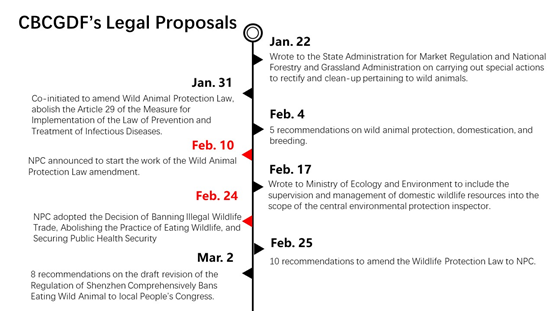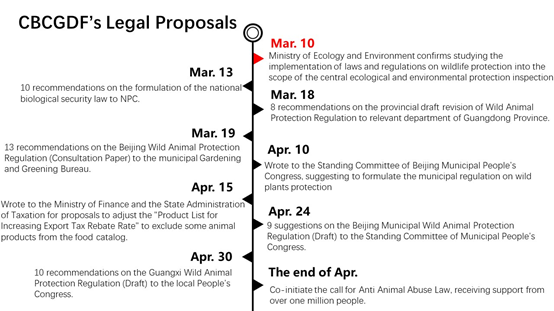Since dozens of pneumonia cases were reported in Wuhan at the end of 2019, which were later confirmed to be caused by a novel coronavirus, the COVID-19 outbreak has ramped up around the globe and become a hot issue with global efforts to fight against. On February 24, China’s National People’s Congress adopted the Decision to Comprehensively Prohibit the Illegal Trade of Wild Animals, Break the Bad Habit of Excessive Consumption of Wild Animals, and Effectively Secure the Life and Health of the People. The Report of Report of the WHO-China Joint Mission on Coronavirus Disease 2019 (COVID-19) published on February 29 confirms that COVID-19 is a zoonotic virus. The pandemic sounds an alarm to the public, warning us that the obsolete practice of eating wild animals is posing huge risks to public health security.
As one of the leading social organizations in China, China Biodiversity Conservation, and Green Development Foundation (CBCGDF) has put relentless efforts in wildlife conservation. An important channel for CBCGDF to achieve the vision of biodiversity conservation and sustainable development is to actively put forward with recommendations and comments directly to policy-makers. CBCGDF has come up with proposals and recommendations concerning relevant legislation, law amendment, and regulations. CBCGDF also promotes public awareness of wildlife conservation and habitat protection via educational activities. Now, CBCGDF's proposals and recommendations to policymakers since the outbreak of COVID-19 are briefly summarized as follows:
On Jan. 22, CBCGDF wrote to the State Administration for Market Regulation, suggesting carrying out special actions to screen and rectify the illegal wildlife market.
On Jan. 22, CBCGDF wrote to the National Forestry and Grassland Administration, suggesting carrying out special actions nationwide to screen and rectify illegal hunting, breeding, operation, and utilization of wildlife.
To promote the establishment of a comprehensive, effective and long-term legal mechanism, and solve the problem of animal epidemic prevention, on Jan. 31, CBCGDF put forward with two suggestions with several social organizations:
To amend the Wild Animal Protection Law and ban the practice of wildlife breeding and transactions.
To abolish the Article 29 of the Measure for Implementation of the Law of the People's Republic of China on Prevention and Treatment of Infectious Diseases and prohibit non-companion dog and cat trade.
On Feb. 4, CBCGDF put forward with five recommendations to the central government’s instructions on Strictly Banning and Cracking Down Illegal Wildlife Market and Trade.
On Feb.25, CBCGDF submitted ten recommendations to amend the Wildlife Protection Law to the Legislative Affairs Commission of the Standing Committee of the National People’s Congress (NPC) of China.
On Feb. 17, CBCGDF sent an official letter to the Ministry of Ecology and Environment, recommending including the supervision and management of domestic wildlife resources into the scope of the central environmental protection inspector. On March 10, Liu Youbin, spokesman for the Ministry of Ecology and Environment, said at the press conference that the Ministry is studying the implementation of laws and regulations on wildlife protection into the scope of the central ecological and environmental protection inspection.
On Mar. 2, CBCGDF sent recommendations on the draft revision of the Regulation of Shenzhen Special Economic Zone Comprehensively Bans Eating Wild Animal to the municipal Standing Committee of the People’s Congress.
On Mar. 13, CBCGDF sent its 10 recommendations on the formulation of the national biological security law to the Working Committee of Legal Affairs of the National People’s Congress.
On Mar. 18, CBCGDF sent 8 recommendations on the provincial draft revision of Wild Animal Protection Regulation to the relevant department of Guangdong Province.
On Mar. 19, CBCGDF put forward with 13 recommendations on the Beijing Wild Animal Protection Regulation (Consultation Paper) published by the municipal Gardening and Greening Bureau on Dec. 19 last year.
At the beginning of April, Clematis acerifolia Maxim, the municipal first-class protected wild plant, were illegally dug. On Apr. 10, CBCGDF wrote to the Standing Committee of Beijing Municipal People’s Congress, suggesting formulating the municipal regulation on wild plants protection for the conservation of plant genetic resources.
On Apr. 15, CBCGDF wrote to the Ministry of Finance and the State Administration of Taxation for proposals to adjust the "Product List for Increasing Export Tax Rebate Rate" to exclude some animal products from the food catalog.
On Apr. 24, CBCGDF submitted 9 suggestions on the Beijing Municipal Wild Animal Protection Regulation (Draft) to the Standing Committee of Municipal People’s Congress.
On Apr. 30, CBCGDF submitted 10 recommendations on the Guangxi Wild Animal Protection Regulation (Draft) to the Guangxi Zhuang Autonomous Region’s Standing Committee of People’s Congress.
At the end of April, CBCGDF’s Endangered Species Special Fund co-initiated the call for Anti-Animal Cruelty Law with the incentive of promoting the legislation and ensuring animal welfare. The call received support from over one million Chinese individuals in only two days.


(Photo credit: CBCGDF)
By / Wang Yanqing Modified / Maggie
